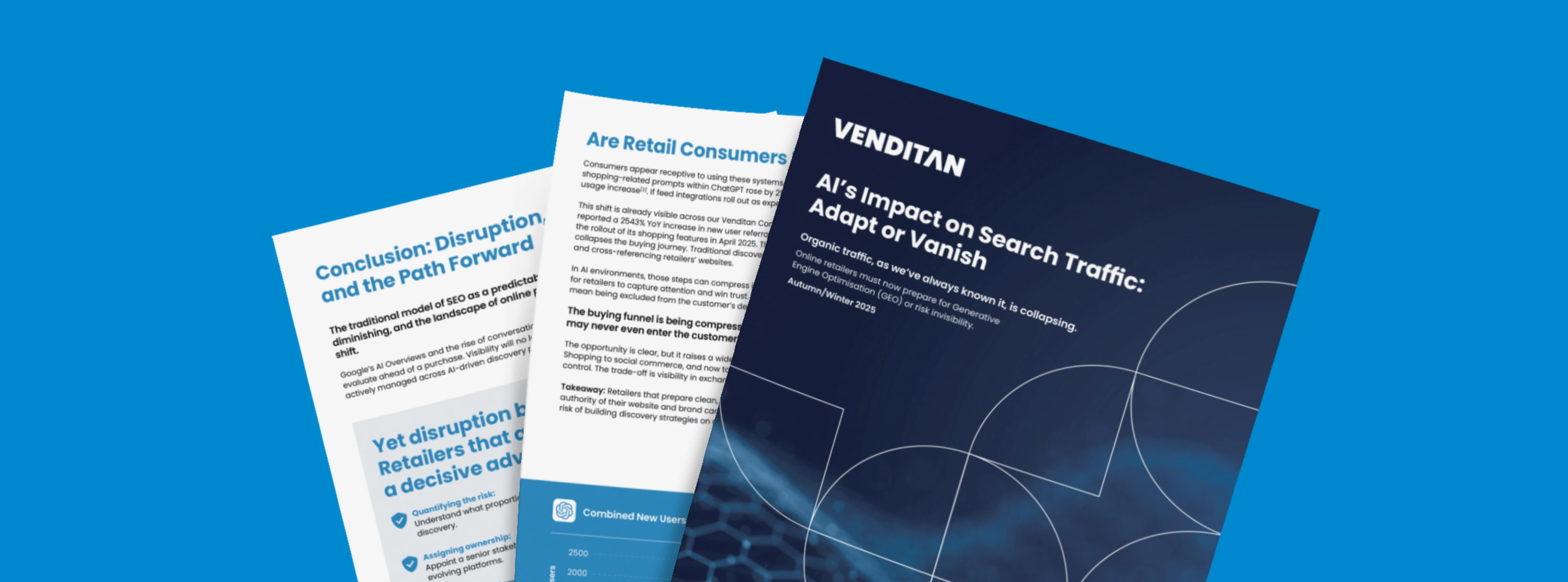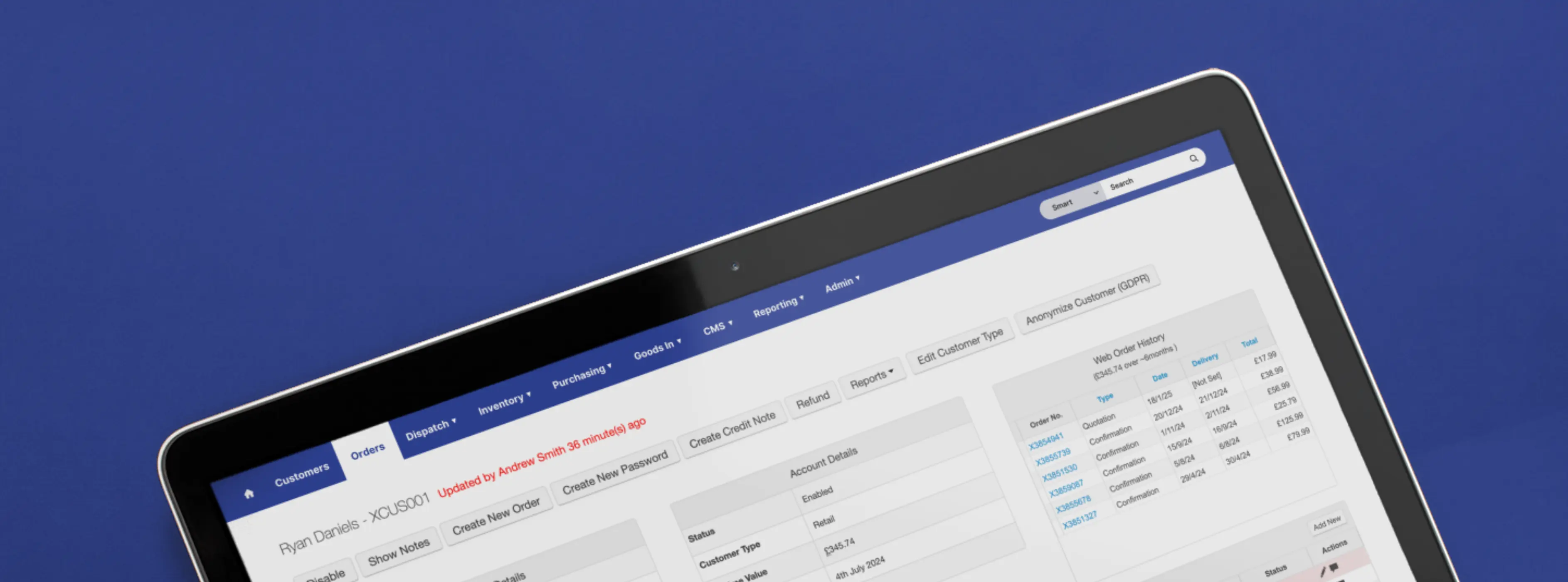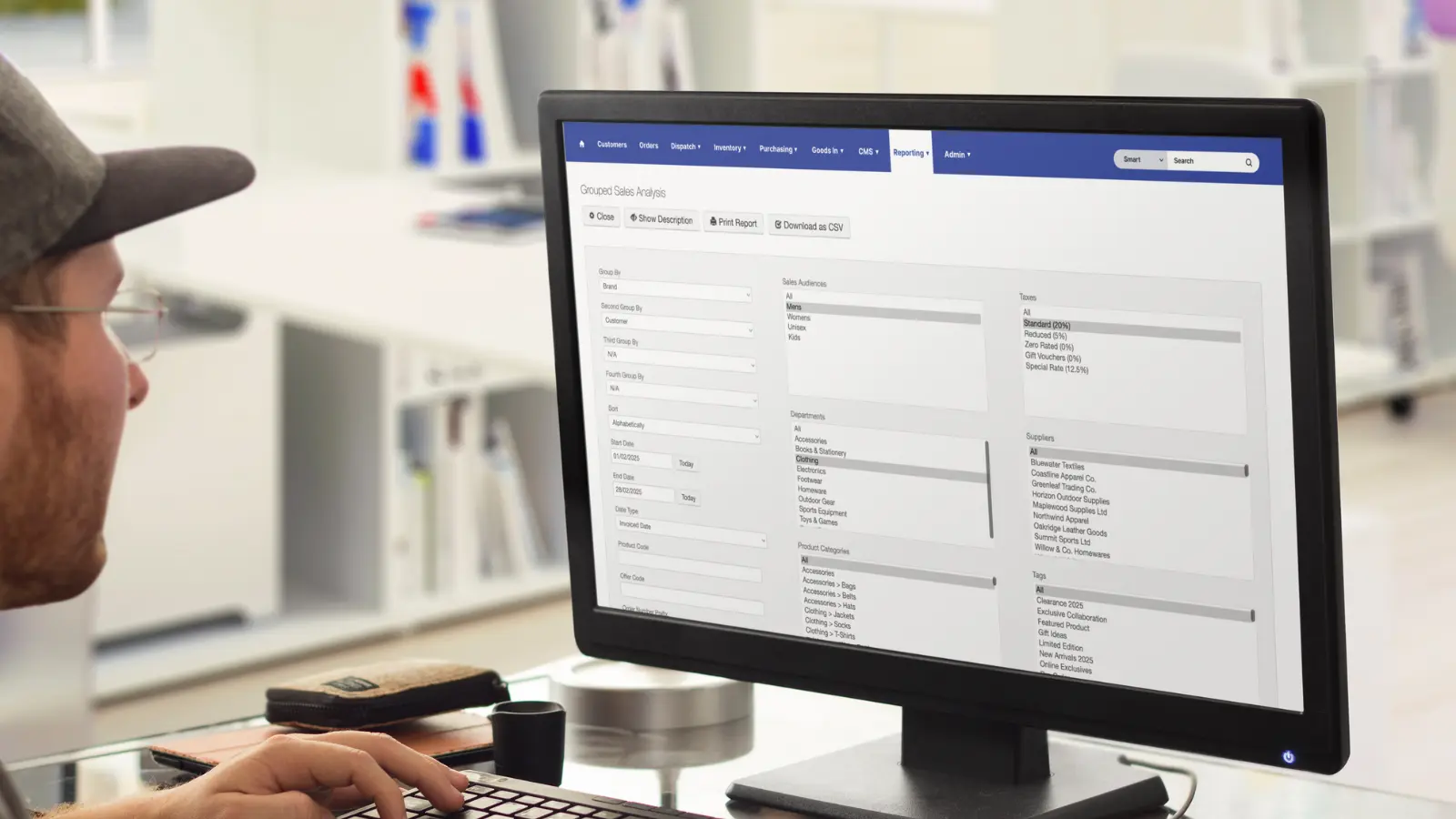If you’re here because you’re planning on migrating from Shopify to another eCommerce platform, then it’s commendable that you’re putting in the research before making the switch.
eCommerce migrations need to be meticulously considered, planned and delivered. Failure to do so will almost certainly result in negative consequences that directly impact your bottom line.
We regularly handle migrations to our eCommerce platform, Venditan Commerce, and offer the guarantee of a refund if we cannot complete the work on time.
As such, we are well-positioned to offer impartial advice to any online retailer that is considering making the switch from Shopify. These are conversations that we regularly have with potential customers and we hope that you find some value from us.
Without further ado, here is what you should consider before migrating from Shopify.
Validate your reasons for migrating from Shopify
First of all, just make absolutely sure that migrating from Shopify is in the best long-term interests of your business.
While not irreversible, an eCommerce replatforming can be time-consuming and costly. You don’t want to commit to the project only to find out a month later that you were better off sticking with Shopify.
Common reasons for migrating from Shopify
There are several reasons why an online retailer would make the decision to migrate from Shopify.
Does any of this sound like you?
- Your online retail business has grown substantially and you are now finding that your operation stretches the Shopify platform beyond its capabilities. Shopify is an outstanding out-of-the-box eCommerce platform for start-up and SME eCommerce businesses but tends to provide operational challenges once you grow.
- Your monthly Shopify operational costs have spiralled. You started on the Basic plan but you’re now on Shopify Plus. Perhaps you’re having to use third-party technology to manage aspects of your operation that Shopify doesn’t cater for. You’re therefore in the market for a more cost-effective alternative.
- You would benefit from more face-to-face support and guidance than Shopify provides. Shopify is self-service in the main, with technical support only given to Shopify Plus customers.
- You have ideas for a custom eCommerce design project that would not be supported by one of Shopify’s pre-made website templates.
- Your website’s SEO is underperforming and you are conscious that you may have made a mistake during the set-up of your eCommerce website, particularly as Shopify’s self-service model assumes knowledge of this advanced practice.
As long as you have exhausted all avenues towards a solution, you can begin migrating from Shopify safe in the knowledge that you have made the right choice for your eCommerce business.

Choose your next eCommerce platform very carefully
Take the time to consider which eCommerce platform is right for this next important chapter in your eCommerce journey. But, what is right? That will largely depend on your requirements.
You should be aiming to be confident in the platform’s:
- Functionality - what it does
- Usability - how it does it
- Scalability - what it can do in the future
- Security - how secure and compliant it is
Platform functionality
Different eCommerce platforms offer varying features and functionalities. It's essential to assess whether the platform can satisfy any functionality gaps that are pushing you towards migrating in the first place.
Do the features and systems cover your existing operation?
Consider features like product management, inventory tracking, payment gateways, shipping options, customisation options, mobile responsiveness and SEO capabilities.
Will the platform integrate with any essential third-party technologies?
Assess the platform's ability to integrate with other tools and systems, such as accounting software, CRM systems, email marketing platforms, and third-party extensions or plugins. Seamless integrations can streamline business operations and enhance the overall efficiency of your online store.
Are you able to flexibly add your own content to the website?
Do you work at pace, creating new landing pages and marketing content on a regular basis? Perhaps you place a particular emphasis on your blog content strategy?
All of this will need to be considered when choosing your next eCommerce platform, as migrating to a platform that does not give you the flexibility you need will quickly lead to frustration and spiralling costs as you pay for these pages to be designed and developed externally.
Payment and shipping options
Check the payment gateway integrations available on the platform to ensure they support your preferred eCommerce payment solutions. Similarly, assess the platform's shipping options and whether they align with your business requirements, such as international shipping or integration with specific shipping carriers.
Platform scalability
As your business grows, your new eCommerce platform should be able to accommodate increasing traffic, products, and transactions. Assess the platform's scalability and whether it can handle future growth without compromising performance and user experience.
Platform usability
We’re not here to badmouth Shopify, it offers a clean and intuitive user interface that is very easy to use. If you’re migrating away from a platform that holds your hand, you’re really going to want to consider the user-friendliness of your next one.
You don’t want to end up frustrated by a product that is difficult to use. Find a platform that can save you time and effort, allowing you to focus on core business activities.
Platform security
eCommerce platforms handle sensitive customer information and online transactions, so security is paramount. Consider the platform's security measures, such as SSL encryption, PCI DSS compliance, and regular security updates to protect customer data and maintain trust.

Evaluate your own technical understanding
With your next eCommerce platform selected, you will then need to decide who handles the migration project.
A lot of skilled, technical work is required to migrate an eCommerce operation from one platform to another. The required skills can include project management, website design and development, server administration, database management, FTP, content migration, SEO, testing and cybersecurity - the majority of which we will explore in more detail later in this article.
We implore you to be critical of your own technical understanding and only take on the project internally if you are confident that you have the in-house capabilities to deliver a successful migration away from Shopify.
Depending upon the platform you migrate to, some technology providers may have their own tailored migration services. This is particularly useful if you are migrating from Shopify to a specialist provider.
By carefully considering these factors, you can make an informed decision when choosing an eCommerce platform that aligns with your business goals, offers the necessary features and scalability, and provides a positive user experience for both you and your customers.
Customer information - handle with care!
If you have been in business for a number of years then you will have no doubt built up a large amount of customer data, covering sensitive information such as names, addresses, contact details, payment information, order history and passwords.
Safeguarding this data during your migration is essential to protect customers' privacy and prevent unauthorised access, identity theft, fraud, security breaches and continuity of service following the migration.
Failing to handle customer data securely can have severe legal, financial, and reputational consequences for an eCommerce business.
When handling customer data during an eCommerce platform migration it is important to follow best practices to ensure the safe handling and transfer of data. Here are some key steps to consider:
Start with a data audit
Start by conducting a comprehensive audit of your customer data. This will help you understand the scope of the data that needs to be migrated and enable you to prioritise security measures accordingly.
Minimise your data where possible
Before migrating data, review and assess if all the customer data you have is necessary. By removing any outdated, irrelevant, or unnecessary information you can substantially reduce the amount of sensitive data being transferred. This lowers the risk exposure.
Take a backup
Take multiple backups of the customer data before initiating the migration process. In the event of any data loss or corruption during migration, having backups ensures that you can restore the data and minimise disruptions.
Encrypt the data and transfer it securely
Encrypt the customer data before migration and ensure it remains encrypted throughout the migration process. This adds an extra layer of protection in case of any unauthorised access or data breaches.
Use secure transfer protocols, such as HTTPS or SFTP to encrypt data during transit. These protocols ensure that the data being transferred between servers or systems is protected against unauthorised individuals trying to intercept or access it.
Control access to the data
Limit access to customer data during the migration process. Grant access privileges only to authorised personnel directly involved in the migration, and liaise with your new platform provider for any NDAs that may be necessary.

Use the migration as an opportunity to review your product data
Your migration from Shopify to another platform presents an excellent opportunity to enhance the overall quality and consistency of your product information.
Product data will need to be cleaned and standardised to the requirements of the new platform anyway, so why not take the opportunity to identify and correct any errors, inconsistencies, or duplications in product titles, descriptions, attributes, and categorisations?
Taking things one step further, you may wish to use the migration as an opportunity to enrich your product data with additional information such as improved descriptions, images and videos, customer reviews and technical information. Enhanced product data can improve the customer experience, aid in better searchability, and drive conversions.
Migrating data that is accurate, complete and improved provides a solid foundation for your new eCommerce platform and starts your next chapter off on the right note.
SEO is real and deserves your full attention
More often than not, when migrating from one eCommerce platform to another, the process will involve the design and development of a new eCommerce website.
As with any website relaunch, there are significant SEO implications involved.
The migration must be handled with care and consideration to maintain (or improve!) the search engine rankings of the website.
What are your current organic Google rankings?
The first step is to familiarise yourself with your current SEO performance. What does your eCommerce website currently rank for, and what pages has Google prioritised for rankings on your website?
It is important that you understand this so that you can plan your migration activity to protect your most lucrative rankings.
Those who do not retain the services of an SEO agency or specialist may wish to invest in a search marketing platform like Ahrefs, Semrush or Moz to access this information. Clients migrating to the Venditan Commerce platform can engage in a workshop to understand this information and build out the appropriate specifications.
Understand your backlink profile
As discussed in our exploration of SEO for eCommerce, backlinks are one of the four fundamental pillars of a successful SEO campaign. Simply put, you need other, authoritative websites linking to yours so Google can see that your website is one to be trusted.
When migrating to a new eCommerce platform there can be a temptation to completely restructure your website with new URLs. This is fine to do if handled correctly (more on this later) but we would recommend running a backlink audit before making any decisions.
This will give you an in-depth understanding of every backlink that your website has. What’s particularly important is that you can see which of your products, categories and blog content have built up backlinks over time. These are the URLs that you want to protect during the migration process, or you risk losing them, which would have a negative impact on the overall authority of your domain and website.
Don’t rebuild your website architecture unless it is essential
During the migration, keep your site structure and URLs as consistent as possible. If changes are necessary, set up proper 301 redirects from old URLs to their corresponding new URLs. This helps search engines understand the new website structure and preserve the link equity and rankings of your existing pages, as mentioned above.
Have you changed domain name?
If you have changed your website address as part of your migration to a new platform then you should use the Change of Address tool in Google Search Console to notify Google of this update. This informs search engines that your website has moved to a new domain or URL structure and helps them update their index accordingly.

How will you be supported by your new platform provider?
Reflecting back on the opening section of this piece - why do you want to migrate away from Shopify? The leading non-technical reason is the level of support provided against the premium price point charged.
If you are migrating from Shopify because you require a more detailed and thorough level of support and guidance, then you will need to research this in detail as part of your investigation into alternate platforms.
If you require more support because you are looking for a technology provider that offers growth services then you should consider asking for case studies that demonstrate how the providers have taken similar companies to yours from Shopify to their platform and scaled their operation and revenue.
Other considerations include:
- Does the new platform offer training resources online to help you maximise the platform?
- What is the availability of support with the new platform provider? Mon-Fri 9-5? 24/7-365?
- What is the new platform provider’s preferred method of support contact, and does it suit your needs?
Check for reviews and testimonials
Finally, as part of any due diligence into your next eCommerce platform, you should research user reviews and ask for feedback from other businesses using the platform to gauge their experiences and satisfaction.
Consider the platform's reputation, reliability, and longevity in the market before making any commitment.
Final thoughts
Regardless of the platform you are migrating from, these are projects that need to be handled carefully to safeguard the integrity of your data, the potential impact on SEO, compliance and your eCommerce business’ reputation.
By ensuring a smooth transition, eCommerce migrations help businesses maintain their competitiveness, safeguard their reputation, and ensure continued success in the online marketplace.
We strive to complete migrations to Venditan Commerce within on time, or we refund the customer their set-up costs. If you would like to discuss this, or our eCommerce platform in more detail you can contact us here.
Our recent posts
Keep up to date with the latest news and insight from the team at Venditan
-p-2600.webp)












